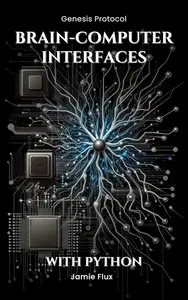
Free Download Brain-Computer Interfaces: Programming Real-Time Neural Interaction Systems With Python by Jamie Flux
English | November 10, 2024 | ISBN: N/A | ASIN: B0DMNJ37VJ | 381 pages | PDF | 1.46 Mb
Discover the cutting-edge realm of Brain-Computer Interfaces (BCIs) with this comprehensive guide that delves deep into the programming and implementation of real-time neural interaction systems. Whether you're a seasoned researcher or an enthusiastic newcomer, this book offers a treasure trove of advanced techniques designed to transform how we interact with neural data. Packed with Python code for each chapter, this resource is perfect for those ready to turn theory into practice.
Key Features:
* Comprehensive Coverage: Spanning foundational math to advanced neuroscience, this book equips you with the skills needed to excel in BCI development.
* Practical Python Implementations: Apply what you learn immediately with Python scripts tailored to each technique.
* Multidisciplinary Approach: Bridging disciplines from signal processing to machine learning and neuroscience, providing a holistic understanding of BCIs.
Book Description:
This book is your ultimate resource for building real-time neural interaction systems. It offers a depth of knowledge across numerous techniques used in EEG signal analysis, feature extraction, noise cancellation, and much more. With a focus on practical applications, readers can explore detailed explanations paired with Python implementations that facilitate a hands-on approach to learning. Unlock the potential of cutting-edge tools like wavelet transforms, convolutional neural networks, and reinforcement learning, among others, to create systems that respond to neural data in real time.
What You Will Learn:
* Master the Discrete Fourier Transform (DFT) for real-time frequency domain analysis in BCIs.
* Harness the Short-Time Fourier Transform (STFT) to create and interpret spectrograms dynamically.
* Explore wavelet transforms for detailed multiresolution analysis of neural signals.
* Implement Empirical Mode Decomposition (EMD) and the Hilbert-Huang Transform for adaptive signal analysis.
* Utilize Principal Component Analysis (PCA) for effective dimensionality reduction in large neural datasets.
* Separate and mitigate artifacts in neural recordings with Independent Component Analysis (ICA).
* Apply the Common Spatial Patterns (CSP) algorithm to optimize feature extraction in motor-imagery BCIs.
* Maximize correlations with Canonical Correlation Analysis (CCA) in multi-channel signal processing.
* Develop robust neural classifiers using Support Vector Machines (SVMs).
* Improve class separability through Linear Discriminant Analysis (LDA) and Fisher's Criterion.
* Model temporal dependencies with Hidden Markov Models (HMMs) in sequential data.
* Design Convolutional Neural Networks (CNNs) to learn spatial features in neural data.
* Utilize Recurrent Neural Networks (RNNs) and Long Short-Term Memory (LSTM) units for capturing temporal dynamics.
* Implement transfer learning to adapt BCI models for different subjects or tasks.
* Analyze EEG signals using Riemannian Geometry for enhanced classification.
* Model neural connectivity through Graph Theory for better network understanding.
* Employ Kalman Filters for real-time state estimation in dynamic systems.
